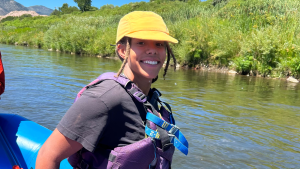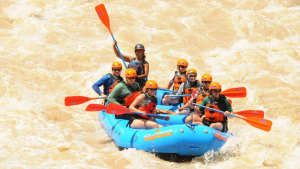
Representation matters in outdoor spaces. Jamilah Toure shares her experience as the only black woman raft guide on the Arkansas River in Cañon City, Colorado to help the paddling community understand why.
When I first entered the rafting community 3 years ago, it came as no surprise to me that the industry was dominated by white men, in regard to both the business and boating sides of rafting. With this country’s history, it makes sense. As a result of the rafting industry being dominated by white men, there are gender and racial biases ingrained in the way white water rafting is taught, practiced, and shared. Of the 17 different companies and the hundred of guides I have seen on the river in Cañon City, I am the only black woman I know of guiding on the Bighorn Sheep and Royal Gorge sections of the Arkansas River.
Growing up in Colorado, I have always had such a rich appreciation for the outdoors and a desire to spend as much time as possible in nature. I have been fortunate enough to have been raised by two loving, outdoorsy parents who taught me fundamental lessons about outdoor activities like camping and hiking. As I’ve grown older, my passion for the outdoors has matured into pursuing an education focused on environmental sustainability as well as environmental racism. Both my career and educational decisions are centered around my access to outdoor recreation. I am what some people might call a “river rat”, a “ski bum”, a “granola girl”, or even a “hippy”, but I certainly do not look like the typical person that one thinks of when those terms come up.

When I accepted the offer to be a raft guide on the Arkansas River, I was consciously making a decision to spend my summers outdoors pursuing my passion for outdoor recreation and education. Unconsciously, I was embarking on a journey of empowerment and resistance against racist and prejudice institutions. I am very thankful that my company is progressive in the rafting industry in the sense that we have almost equal numbers of female raft guides as we do male guides. Most other companies that I know of and have heard about have many more male guides than female guides, if they have any female guides at all. Even with progressive companies like mine, conscious and unconscious sexism is still very present within my workplace and the industry as a whole. As a black woman, I have been a first hand witness of how sexism and racism can be intertwined and act as almost insurmountable barriers to black women in the outdoor industry.
Like other women in fields similar to mine, men regularly make inappropriate comments about my body that make me uncomfortable. I have noticed that there has been a very specific pattern of the comments made towards me, a black woman, in comparison to my white coworkers. Most of the comments that people make about me are about my butt, my hair, my curves, or my lips. This is not a coincidence, and I know for a fact that my white friends do not get the same types of comments that I get. These are stereotypical black woman features that are all too often sexualized by men. I sometimes feel like a zoo animal or an outsider where I work because of comments like these. No one looks like me. No one I work with shares the intersectionality of being both black and a woman. I have no one to talk to about my experiences who will fully understand any of the emotions I feel. It’s very isolating.
Even when I leave my workplace to go into town, I still feel out of place, and I always have my guard up. The county that Canon City is in, Fremont County, has the most prisons of any county in the United States — 11 prisons total. I drive right by a prison every single time I go into town. Every time I pass it, I am always thinking about the same prison statistics that I’ve had memorized for years now: the United States has 4% of the world’s population but 16% of all the incarcerated people in the world, and 35% of the people incarcerated are black men even though they make up only 13% of the population. I wonder how many people are in those prisons that I pass by weekly as a result of over policing, unjust laws, poverty, and a corrupt judicial system. I feel guilty that I am so lucky to have such amazing freedoms while my brothers and sisters are locked up right under my nose. Sometimes I can feel their anguish as I pass the prisons.
Additionally, Canon City is the whitest city I have ever lived in, and I go to university in Boulder, so that should really tell you something. Almost every time I go into town to do laundry or get groceries, I am stopped by a local (or a tourist), and they will make a comment about my body, skin color, and/or hair. I have even been stopped at traffic lights while in my car so a passerby could let me know they think my skin is beautiful and they wished they had skin like mine. Although their comments might seem nice to them, they are microaggressions and constant reminders that I am not like the others here.
As a black person, sticking out in a white town is extremely dangerous and keeps me on edge. They make it clear that I do not fit in, and from the looks I often receive and whispers I can sometimes overhear, some people make it known that they do not think I should be there because of my skin. It is definitely worth it to note that I have met some lovely, inclusive people in Canon who are nothing like the people who have made racist and inappropriate comments towards me.
I have faced many challenges as most black people do in the outdoor industry. Honestly, I used to question if being a raft guide is worth the daily struggle of being “othered.” Through all the discrimination and prejudice I encounter, I choose to continue to be an outdoor professional, so all the people I get to guide through the outdoors will have an enjoyable adventure free from the sexism and racism I’ve experienced. For example, I had the privilege to guide two ladies from the panhandle of Texas down our beginner, class II stretch of white water. Both of the woman were older, one of them was black, and the other one was white.
Now, I’ve guided down the class IV section of very exciting and beautiful white water, and that class II trip with those two ladies was the most empowering, wonderful trip I have had throughout all my time as a guide. The ladies were just so excited to be outside and to spend time with each other. We had moments in the boat where we all could not stop laughing it was so fun, and there were also moments all three of us were silent because we were all just enjoying the environment with each other.
I remember coming back from that trip and telling all my guide friends that trips like that are the reason I wanted to become a guide in the first place. I was able to share the river with people who loved it as much as I do, and I was able to guide them in a way that made them feel comfortable, included, and empowered. They had such a good time that one of the ladies came back a couple weeks after with her grandchildren, so I was able to guide them down the river again. I loved it so much.

At the end of the day, I feel at home between the walls of the canyon. I feel so held by the river. I feel challenged and pushed to grow. I feel happy here, and I deserve to be happy. The people at my company also make it easier. Having a group of kind guides that are so well versed in guiding techniques, medical training, and outdoor knowledge has been a crucial part in my development as a black woman in the outdoor industry. It has also been so meaningful and important to me that I have such an amazing black mentor and friend who works at my company and has been guiding for 14 years (shoutout, Alfredo!).
I continue to be an inviting face as a raft guide on this river to make everyone who is in my boat feel welcomed whether it is their first time rafting or their first time being in an environment like the canyon in general. I belong in the outdoors just as much as everyone else. Being black and being outside is revolutionary. I hope to inspire other black girls and women to venture outside by being my authentic, dirty, river ratty, hippy, granola girly self.
